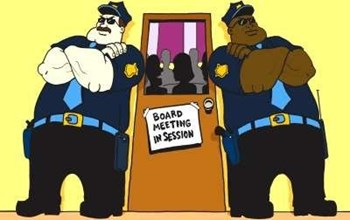
Picture this: a co-op resident has a problem with his neighbor who plays loud music into the wee hours. He contacts his board of directors to see what he can do about this issue, but no one calls him back. Thinking maybe he just fell through the cracks, he calls again. Again, no response.
Eventually, the shareholder begins to suspect that his board doesn't care about him. Feeling ignored, he seethes for a while. When it's time to vote for a new board of directors, he chooses against the original members, feeling as if his needs are not being met.
One of the major complaints residents and owners have about their boards is a lack of communication. Residents may feel as if no one returns their calls, responds to their letters or invites them to meetings. If residents and owners feel ignored, boards can assume it will only be a matter of time before they are voted out of office in favor of a more accessible, chattier governing body.
The purpose of this article is to help boards understand the importance of maintaining clear, open communication with residents and to offer ideas on how they can improve communication in their own buildings.
What to Share—and NOT Share—with Shareholders
Sometimes a board or a management team might not want to jump to respond to a resident's complaint. The reason for this is simple: some information cannot be shared with non-board residents.
Any information dealing with business operations of the cooperative is not generally shared with non-board members. Also, the details of contracts with vendors, delinquency reports or financial records of other residents or potential buyers or personal information of staff should not be shared, according to David L. Berkey, managing partner of Gallet Dreyer & Berkey, a firm that represents more than 100 cooperative and condominium boards in the New York City area.
"These are private business matters that have been entrusted to the board to deal with as it deems best," says Berkey, who has been the co-chairman of the New York State Bar Association's Cooperatives and Condominiums Committee for the past seven years. "I often explain to shareholders that the Business Corporation Law states that the business affairs of a corporation are to be conducted by the board, not the shareholders."
He goes on to say that, while the liability insurance held by the directors and officers of the corporation protects the board members from claims, shareholders have no protection under this insurance if they should make an error of judgment.
"Shareholders often have the idea that they're entitled to just about anything, but they're not," explains Marcie Waterman-Murray, a principal of Deutsch Tane Waterman & Wurtzel, PC, a Manhattan law firm that specializes in co-op and condo law and litigation. "According to the Business Corporation Law, they are entitled to generally very few things."
According to Waterman-Murray, shareholders should have access to the following: minutes of shareholder meetings (not board meetings); a list of shareholders; and a certified financial annual statement. Boards should check their proprietary lease to see what is required of them specifically.
"All financial records and board minutes are available to our shareholders, but we won't distribute them," says Pat Kinsey, president of the board of Bristol House in White Plains. "They are welcome to go to the management company's office to review them."
Be Polite and Act Fast
Even if a board will not (or cannot) discuss a certain issue with shareholders or owners, they should at least offer the courtesy of a response.
"I don't think there are ever legitimate reasons for total silence," says Waterman-Murray. "The board has an obligation—if not a legal one, then a moral one—to respond to a communication from a shareholder, to at least acknowledge it."
Except in extreme cases, where a shareholder might be in litigation with the corporation, Kinsey believes that either her board or the management company should respond to residents as soon as possible. She recommends responding in writing, either via e-mail or letters, with copies placed in the shareholder's file.
The speed at which a board responds, according to Berkey, depends on various things: the type of complaint; whether it requires the board to reconvene; whether any outside evaluation by professionals is necessary; whether this is a new issue or one already addressed by the board; and what kind of additional information the board might need from the resident before coming up with a response.
"Even if there is a delay in response due to any of these items, the board should still send a message to the shareholder advising that the complaint was received and it is being looked into," Berkey points out. "If there is to be a delay, then the shareholder should be advised that there will be a delay and the reason for it."
Of course, if the issue brought up by the resident is an emergency, such as water leaks, very noisy neighbors or dangerous conditions, then the matter should be addressed immediately.
"Issues such as redecoration of a hallway will take time to evaluate, hire experts and obtain proposals," says Berkey. "Sometimes the board will take a survey of all shareholders to see how a majority feel about the issue."
Keep Communicating
Boards, with the help of their management companies, have many opportunities for communicating with residents on a regular basis. Sometimes, this regular communication answers questions before they're asked.
Newsletters, websites, bulletin boards and memos are all good ways of getting the word out there about what's going on in your community.
Once a year, before the annual meeting, Kinsey sends an extensive update (usually about eight pages) to residents. This details what the board has done over the past year and sets priorities for the coming year.
"Sending an update out before the annual meeting answers many questions that might come up during the meeting," she explains.
"I recommend that boards be as communicative with shareholders as possible," Berkey advises. "Quarterly newsletters or memos distributed regarding important decisions or plans, like a major renovation or a new superintendent, are important."
"Websites are coming into their own and can become very useful, but newsletters are still something that is tangible, delivered right to your door. They are still kind of the gold standard, but it is a very labor-intensive job and not many people are willing to do it," says Waterman-Murray.
If no one steps up to take over the daunting task, the newsletter could be a rotating responsibility among board members, she suggests. Alternatively, those very shareholders who have peppered the board with questions might be the very ones who would be interested in working with the board to produce a newsletter.
"Shareholders should not be left in the dark about major decisions, as they will use conjecture and listen to rumors about the board if there is no hard information provided," Berkey proposes. "Many buildings have websites where newsletters can be posted. Some are interactive and permit shareholders to post questions and repair requests."
However, he adds, "there are still many technophobes who will not get information unless it is distributed in hard copy."
"It shouldn't be that once a year shareholders elect directors and then they never have any communication with them until perhaps the pre-election speech at the next annual meeting," argues Waterman-Murray. "You don't want to ignore the people who elected you."
Communicating with Managers
Depending on the community, the manager has some responsibility in facilitating communication between a board and residents. Some boards like to use management just for their office functions: collections, paying the bills, etc., while all the other matters flow directly to the board.
Other communities, however, prefer that every bit of correspondence gets filtered through management first, and then to the board.
"Our management company is the first order of contact for a shareholder," according to Kinsey. "The board doesn't get involved in shareholder issues unless they haven't gotten a satisfactory answer from management."
If the management is unresponsive, the board should take measures to correct the problem.
"Because the board acts as the representatives of shareholders or unit owners, it is their responsibility to see that their constituents' concerns are addressed," says Berkey. "Residential management is a service business and good communication and prompt dealing with problems are the services that boards can and should demand from management—if they're not providing these services, they should be spoken with immediately. If the problems are not resolved, they should probably be replaced."
Kinsey agrees from her board perspective. "If a management company is not responsive, we would first meet with the property manager, and if we could not resolve the issue, we would meet with the owner of the management company. If we don't feel the company is responding to our needs, we would cancel our contract."
Legally Speaking
If a board doesn't communicate clearly to shareholders, thereby showing a lack of trying to perform their jobs properly and diligently, there could be legal ramifications.
"Misleading information could be the basis for a claim that the board is acting improperly," states Berkey. "No communication can be the basis for a claim that the board is ignoring its obligations."
Waterman-Murray sums it all up. "Education has to be on both sides," she says. "Shareholders have to understand that their entitlement to corporate information is really limited and that they depend upon their elected representatives to run the corporation. If they aren't happy with either the results or the communication, then they should express that displeasure."
"But a smart board is going to be responsive to the people who elected them," she adds.
Domini Hedderman is a freelance writer and an aspiring novelist living in Erie, Pennsylvania.






Comments
Leave a Comment